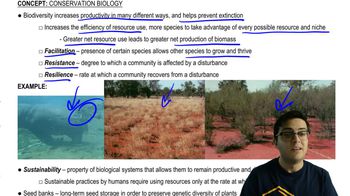Here are the essential concepts you must grasp in order to answer the question correctly.
Ecological Footprint
The ecological footprint measures the environmental impact of an individual or community, expressed as the amount of land and water area required to produce the resources consumed and absorb the waste generated. It reflects how human activities, such as energy use and food consumption, affect the planet's ecosystems and resources.
Recommended video:
Sustainable Practices
Sustainable practices are actions that meet current needs without compromising the ability of future generations to meet theirs. This includes reducing reliance on non-renewable resources, minimizing waste, and promoting renewable energy sources, all of which contribute to a lower ecological footprint.
Recommended video:
Biodiversity and Sustainability
Urban Density and Resource Management
Living in higher density settlements can lead to more efficient use of resources, as it often reduces the per capita consumption of land, energy, and water. Additionally, better management of human wastewater can prevent pollution and promote recycling of water, further decreasing the ecological footprint and enhancing sustainability.
Recommended video:
Density of Liquid Water vs. Solid Ice
 Verified step by step guidance
Verified step by step guidance


